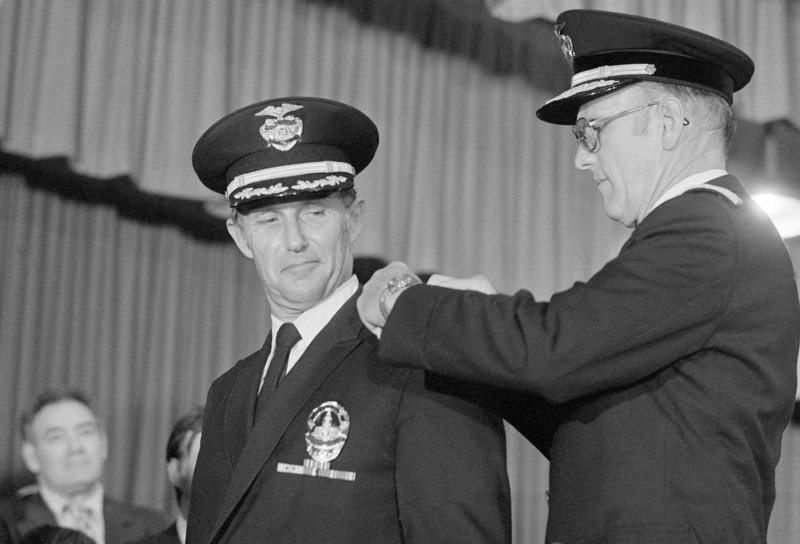LOS ANGELES – Daryl F. Gates, the rookie cop who rose from driver for a legendary chief to become chief himself, leading the Los Angeles Police Department during a turbulent 14-year period that found him struggling to keep pace with a city undergoing dramatic racial and ethnic changes, died Friday. He was 83.
Gates died at his home in Dana Point, Calif., after a short battle with cancer, the LAPD announced.
The controversial chief, whose tenure ran from 1978 to 1992, spent his entire four-decade career at the LAPD, where he won national attention for innovative approaches to crime fighting and prevention: He instituted military-style SWAT teams to handle crises and the gentler DARE classroom program to prevent drug abuse. These initiatives, emulated by police departments across the United States, and other advances, such as a communications system that reduced police response times, bolstered his reputation as an exemplar of modern law enforcement. President George H.W. Bush called him an “all-American hero.”
A proud emblem of progress to some, he was a disturbing symbol of stagnation to others. When the city went up in flames over the acquittal of four white officers accused of beating black motorist Rodney King, he was castigated as a leader out of touch with the changing realities of the city, yet to the end he remained righteous about his authority to police it.
Faced with a proliferation of illegal drugs and street violence, he hammered gangs with police sweeps and broke into crack dens with an armored vehicle armed with a steel battering ram. He made no apologies for declaring that casual drug users should be shot.
turns charming and brash, articulate and tactless, he generated controversy with gaffes about Latinos, blacks and Jews, most famously with a remark about blacks faring poorly under police chokeholds because their physiology was different from that of “normal” people. Fiercely loyal to his rank and file, he clashed frequently with elected officials, particularly when they slashed his budget or meddled in department discipline, and vowed he would never be bullied by “crummy politicians.”
Throughout his tenure, he had a fractious relationship with Tom Bradley, the former LAPD lieutenant and councilman who united a diverse coalition of constituencies to become the city’s first African-American mayor.
Gates “fought vigorously to make sure the chief’s duties were not encroached upon. That comes from understanding the struggles Bill Parker went through moving the department out of corruption,” said City Councilman and former Police Chief Bernard C. Parks. He was referring to William H. Parker, the tough, reform-minded chief in the 1950s and ’60s, who became Gates’ mentor.
Parks said it was important to remember that the vilification of Gates after the King beating was not universal and that his accomplishments as chief mattered to large segments of the city long after he left the department.
“If you go to areas of the Valley, police organizations, officers’ funerals … he gets the loudest ovation,” Parks noted recently. “I’ve never seen a situation where … 18 years after retirement, officers who never worked with him cheer him as chief of police.”
Yet others just as vehemently argue that Gates’ strengths were outweighed by his weaknesses, particularly his failure to evolve with a city whose politics and social fabric had been transformed by the maturing of established minority communities and the flowering of newer ones molded by immigration.
Send questions/comments to the editors.



Success. Please wait for the page to reload. If the page does not reload within 5 seconds, please refresh the page.
Enter your email and password to access comments.
Hi, to comment on stories you must . This profile is in addition to your subscription and website login.
Already have a commenting profile? .
Invalid username/password.
Please check your email to confirm and complete your registration.
Only subscribers are eligible to post comments. Please subscribe or login first for digital access. Here’s why.
Use the form below to reset your password. When you've submitted your account email, we will send an email with a reset code.